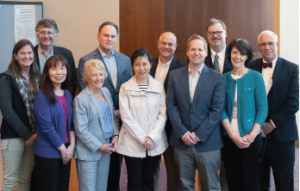
Front row from left: Monica Guma, MD, PhD; Su Yao-Mao, PhD; Thasia Woodworth, MD; Yan Wang, MD, PhD; Jeffery Sparks, MD, MMSc; and Susana Serrate-Sztein, MD.
Back row from left: David Markovitz, MD; Andrew Luster, PhD; Michael Brenner, MD;
S. Louis Bridges Jr., MD, PhD; and James Jarvis, MD.
The 11th annual Investigators’ Meeting and the Rheumatology Research Workshop, held in June in San Francisco, were by all accounts great successes. California sunshine greeted more than 120 attendees as we came together to share the latest advances and updates in rheumatology research. These annual meetings have something for every research professional, whether you work in the lab, the classroom, or the clinic.
Professional meetings such as these provide our members with more than an opportunity to gain knowledge. Each year, these meetings serve as a forum where attendees connect, exchange ideas and share feedback that helps advance their work.
For two days, Foundation-funded researchers, rheumatology fellows, junior faculty, medical/graduate students and residents interested in a research career in rheumatology shared updates on their studies, networked, exchanged ideas and collaborated on future projects to advance treatments and cures for rheumatic diseases. Attendees were abuzz, exchanging new thoughts and ideas, and fueling future projects and collaborations. That is exactly what these meetings are supposed to be about.
Collaboration Encouraged
Beyond providing a platform for established investigators to share updates on their research, the Investigators’ Meeting is a forum for building productive and mutually beneficial relationships with other Foundation-funded investigators. These collaborations help researchers advance their projects and bring new therapies to patients sooner rather than later.
Established rheumatology researcher Harris Perlman, PhD, gave a presentation on his study, “Understanding the Role of Macrophages in the Pathogenesis of RA.” Dr. Perlman’s research seeks to define a method to understand the differential roles that synovial macrophage populations play during the various phases of rheumatoid arthritis (RA). His team was the first to identify transcriptional signatures that are specific to each population of synovial macrophages during the peak of inflammatory arthritis in mice and to perform minimally invasive synovial tissue biopsies on RA patients with active disease. Dr. Perlman’s research could help rheumatology professionals understand the dynamics and pathways involved in the pathogenesis of RA.
Peter Nigrovic, MD, shared research that is leading to a better understanding of the pathways involved in the pathogenesis of RA. Dr. Nigrovic’s research focuses on understanding mechanisms of inflammatory arthritis, using both human samples and mouse models. His study, “Synovial T Resident Memory Cells in Arthritis,” examines recurrent, joint-specific inflammation in adults and children and seeks to characterize the role T resident memory cells (TRM) play in recurrent, site-specific disease. Dr. Nigrovic discussed his progress characterizing TRM from human joint specimens, as well as confirming the role TRM play in recurrent, site-specific disease through the use of a previously developed animal model.


